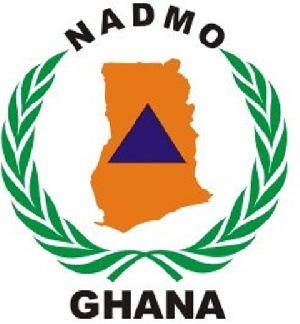The National Disaster Management Organisation (NADMO) has proposed to parliament to enact laws that will empower the organisation to prosecute and punish people and institutions whose activities cause disasters.
It said the proposed law would ensure that the organisation had the legal and constitutional right to sanction people and institutions as well as demolish structures that pose threat to life and security, and those that could lead to disasters.
Mr Jerry Asamane the Upper East Regional NADMO Director, who made the call in an interview with the Ghana News Agency (GNA) in Bolgatanga, disclosed that most of the disasters recorded in the country could have been prevented if the organisation had the legal right to sanction people and institutions.
“We do not have the legal backings to demolish any structure that pose danger and result into disaster whenever we experience heavy rains, storms, and fire outbreaks among others.” The Regional Director said.
Giving the statistics of disasters recorded last year in the region, he said the Binduri District was the hardest hit and suffered almost all the disasters, including rainstorm, windstorm, flood, Fall Army Worm and fire outbreaks.
He added, “last year, we recorded 2,988 people and 18 schools that were affected by rainstorm in the Bulisa South, Bongo, Binduri and Garu-Tempane Districts. We also recorded a total of 3,773 people and 21 schools affected by windstorm in the Bolgatanga and Bawku Municipalities. Bongo and Binduri Districts recorded 362 people affected by disasters and about 10 acres of farmland affected by flood in the Bolgatanga Municipal, Binduri and Kassena-Nankana West Districts”.
The Director indicated that the Fall Army Worm affected about 3,141 acres of farmlands in the Binduri, Bawku West and Kassena-Nankana Districts. The same districts recorded 88 fire outbreaks in which about 458 people were affected.
Mr Asamane said plans were far advanced to develop accurate data system that could explain the causes of the disasters, their time periods and how to prepare to avoid fatalities and safe property and said his outfit had plans to open a radio station to assist to reach more people in the region when they want to disseminate information, adding “education and sensitisation were key to disaster management.”
The Regional Director stated that the organisation had secured its three percent of the District Assembly Common Fund and enough relief items towards the rainy season and said his outfit lacked means of transport to travel to disaster locations.
Pledging his outfit’s commitment to increase efforts in the prevention and management of disasters in the region, Mr Asamane advocated collective efforts from members of the public as well as traditional authorities and the Municipal and District Assemblies to enforce by-laws and punish wrongdoers to serve as deterrent.
He commended the synergy that existed among his organisation and other state agencies such as the Ghana Police Service, the Ghana National Fire Service, the Military, the Ministry of Food and Agriculture and the Regional Directorate of the Ghana Health Service over the years and expressed the hope for stronger collaboration in future.
General News of Friday, 23 March 2018
Source: ghananewsagency.org













